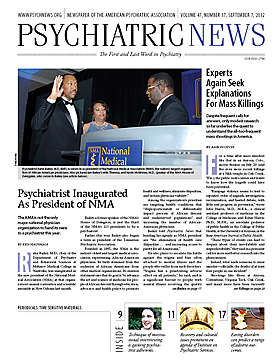Mental illness is the leading cause of global disability, accounting for one-third of disability worldwide, according to 2008 data from the World Health Organization. In the United States, costs of mental illness are 7 percent of total health care expenditures, with the indirect costs substantially higher at 2 percent of U.S. GDP. Over a lifetime, 50 percent of the population will suffer from at least one psychiatric disorder, and each year, nearly 30 percent of adults have a diagnosable psychiatric disorder. Of patients treated, only 32.7 percent receive minimally adequate treatment, the greatest likelihood of receiving it being highest in the mental health service sector and lowest in the general medical sector, which treats the majority of psychiatric patients. Most U.S. psychiatric patients remain untreated or poorly treated.
Psychotherapy is often unrecognized as a low-cost, effective lever to decrease many kinds of costs caused by mental illness. Psychotherapy is defined broadly as treatment of one or more patients with psychological processes, primarily through talking, and includes a therapeutic relationship and a trained therapist. It can include individual, family, and group treatment from several theoretical orientations. Its effectiveness has been established for many conditions, and a growing body of evidence indicates that psychotherapy is cost-effective; reduces disability, morbidity, and mortality; and at times leads to a reduction of medical and surgical services.
Psychotherapy is especially cost-effective for severe disorders, including schizophrenia, bipolar affective disorder, and borderline personality disorder, by leading to improved work functioning and decreased use of hospitalization.
To contain costs, many managed care programs employ as psychotherapists mental health workers with no graduate training. Mojtabai and Olfson reported in 2008 that in U.S. office-based psychiatry practices from 1996 through 2005, psychiatrists provided increasingly more pharmacotherapy and less psychotherapy. Managed care has stressed short-term treatment and biological approaches for mental illness, leaving at risk patients who require a more intensive course of psychotherapy, either alone or in conjunction with psychotropic medication.
Cost-effective analyses determine the relationship between the value of an intervention and its economic impact. Benefits, often difficult to measure economically, include increased earnings of the individual affected, improved role functioning in terms of family and economic behavior, and improved physical and mental health.
“Cost-effective” does not mean “cheap.” It refers to the value returned per dollar spent (as opposed to cost reduction or dollars saved) and indicates a measure of efficiency that can at times be improved by spending more and at times less. Focusing solely on cost reduction may actually result in increased inefficiency. In fact, the need to demonstrate that psychotherapy provides cost savings in medical and surgical services, or “cost-offset,” is a double standard for psychotherapy compared with other medical treatments.
Three percent of the population has been in outpatient therapy, with the poor and near-poor using long-term treatment in proportion to their numbers in the population, disconfirming the stereotype of psychotherapy as an unnecessary self-indulgence for the affluent. Just as sicker people consume more services for most chronic medical conditions, patients in long-term psychotherapy (over 20 sessions) comprise 16 percent of therapy patients, account for 63 percent of psychotherapy costs, are more distressed and in poorer general health, have higher general medical costs and more functional impairment, are more likely to need psychotropic medication, and more likely to have a psychiatric hospitalization than patients in short-term therapy. Despite fear that readily available outpatient psychotherapy would be overused, a Rand Corporation study demonstrated that when weekly outpatient psychotherapy is fully covered, only 4.3 percent of the insured population uses it for an average of 11 sessions.
In an update of their 1994 study published in the November 2002 American Journal of Psychiatry, Olfson, Marcus, and Druss found no change in the overall rate of use of psychotherapy from 1987 to 1997, but the number of visits per patient was significantly lower, with a marked decline in the proportion of patients in longer-term psychotherapy from 15.7 percent to 10.3 percent. In 1987 a much larger percentage of psychotherapy patients (61.5 percent) were also receiving medication. One-third of psychotherapy patients received only one or two sessions, indicating that there is a decreased emphasis on a psychotherapeutic approach and that much of the psychotherapy in the United States is shallow and of limited benefit.
For years insurance companies have limited coverage for psychotherapy with higher copayments, stricter yearly limits, and lower lifetime limits than for other medical care. Despite the widespread assumption that psychotherapy benefits will be overused and inflate health care expenditures more than other medical benefits, studies document that higher copayments for mental health services reduce both initial access to and treatment intensity of mental health care and impact patients at all levels of clinical need. Very ill psychiatric patients are equally affected by discriminatory copayments, and managed care has caused a generalized reduction of psychiatric care.
In reality, there is a very low additional expense for providing parity for all appropriate treatments for mental illness, and a 2005 study found that parity increased costs by a few percentage points at most, reduced out-of-pocket costs for patients, and should be affordable on a national level.
In October 2008, the Paul Wellstone and Pete Domenici Mental Health Parity and Addiction Equity Act mandating insurance coverage for mental health treatment equal to that for other medical care was signed into law. The mandate applies to insurance plans that already cover mental health care in plans covering 50 or more, does not preempt stronger state laws, and took effect in 2010.
The volume
Psychotherapy Is Worth It: A Comprehensive Review of Its Cost-Effectiveness examines the literature on the cost-effectiveness of psychotherapy for the years 1994 through 2007. For some illnesses (anxiety disorders, posttraumatic stress disorder, and substance abuse), cost-effectiveness can be demonstrated indirectly by comparing the high costs of the untreated illness with the known efficacy of specific psychotherapeutic treatments. The majority of the studies document the cost-effectiveness of the psychotherapeutic treatments for schizophrenia, borderline personality disorder, depression, and psychiatric illness in medical patients and for chronic anxiety, depression, and personality disorders requiring extended and intensive psychotherapy.

Susan G. Lazar, M.D., is a clinical professor of psychiatry at Georgetown University School of Medicine, George Washington University School of Medicine, and the Uniformed Services University of the Health Sciences. She is a supervising and training analyst at the Washington Psychoanalytic Institute. She is the coauthor and editor of Psychotherapy Is Worth It: A Comprehensive Review of Its Cost-Effectiveness from American Psychiatric Publishing. APA members can order the book at a discount at www.appi.org/SearchCenter/Pages/SearchDetail.aspx?ItemId=7215. 
